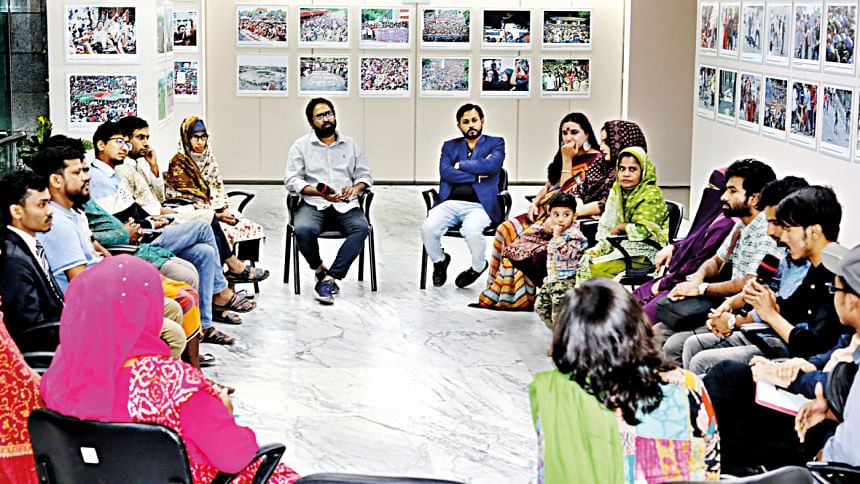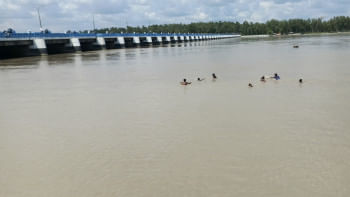Recognising the marginalised heroes of the July Uprising

The July uprising in Bangladesh was a pivotal moment of bravery, sacrifice, and collective rage. The streets boiled with defiance as people, desperate for change, faced bullets and batons. While the students who led the charge are applauded and remembered, a quieter, more painful story lives in the shadows -- the story of the marginalised. These voices deserve recognition. They are the foundation of the July uprising -- fighting for a fairer Bangladesh where everyone can thrive, regardless of their background.
On a poignant day of remembrance at The Daily Star's event, "Marginalised Voices of the July Revolution," these invisible heroes shared their stories, revealing the raw wounds they still carry.
The pain of erasure
The uprising wasn't only about students. The marginalised -- the rickshaw pullers, the garment workers, the homeless, and the Hijra community -- also bore the brunt of this movement. They bled, suffered and died.
Rickshaw puller Noor Muhammad's eyes welled up as he recalled a heartbreaking task. On August 4, the police took Noor by his hand and forced him to transport the injured body of Golam Nafiz on his rickshaw.
Noor recounted, "I was carrying a passenger and suddenly the police stopped me. Amidst the chaos, the police instructed me to carry a young boy's injured body. There was no one to assist me."
"No mother should lose her child this way," Noor cried, his voice breaking under the weight of his memories. Rejected by hospitals, he eventually arranged for an autorickshaw to take Nafiz to Shaheed Suhrawardy Medical College and Hospital. But hope was a cruel illusion.
Similarly, Md Jobaer Hasan's eyes were hollow when he recounted what happened to his younger brother, 15-year-old Julfiqar.
The boy went missing during the chaos of the uprising, and for six days, the family swung between hope and despair. When they found him at the Dhaka Medical College Hospital (DMCH) Burn Unit, the reality was a nightmare.
"His eye was completely damaged, and over 100 shotgun pellets were lodged in his body," Jobaer whispered. His voice trembled under the weight of helplessness.
Why is it that when marginalised families like Jobaer's seek justice, they encounter indifference? Why does the state's compassion seem to dry up when the victims are poor, nameless, or faceless in the eyes of the elite?
If Julfiqar had been the son of a politician or an industrialist, his story would have dominated the headlines. But because he was just a boy from a struggling family, his pain became a whisper in the wind.
We need to stop treating justice as a privilege for the few. The government must provide comprehensive medical and psychological support to victims like Julfiqar and their families.
The dream deferred
Shariful Islam, a private service holder, highlights another harsh reality of the marginalised: the humiliation of asking for help.
Shot on August 5, Shariful bore his wounds with dignity, only to be met with apathy at the hospitals. The financial aid he eventually received from the July Smriti Foundation felt like a slap in the face.
"I had to go to the July Smriti Foundation for assistance," he said, frustration colouring his words. In a just society, a man who risked his life for change shouldn't have to beg for dignity afterwards.
The narrative we often hear celebrates the student leaders who stood at the forefront of this revolution. Their courage is undeniable and deserves every bit of recognition. But the glaring truth remains: the marginalised likewise bore the brunt of this movement.
Mahfuzur Rahman Shamim, convener of Bangladesh Janatar Sangsad, captured this hypocrisy perfectly: "If we fail to include them as stakeholders in building a new Bangladesh, we are not heading towards true democracy."
Pria Khan, a member of the Hijra community, recalled, "We served at DMCH from July 17, witnessing a relentless wave of dead bodies." On July 19 alone, the death toll overwhelmed the morgues. "Bodies were arriving on stretchers, in ambulances, and even on rickshaws," she remembered.
Her community collected 730 bags of blood and raised Tk 3 lakh for the injured. But their efforts were met with hostility. "My phone was snatched, videos deleted, and I was threatened for documenting the atrocities," Pria revealed. Yet their service, like their pain, remains invisible to many.
The statistics are damning. 80 per cent of those killed during the July uprising were not students, but workers -- rickshaw pullers, garment workers, and the homeless. These are the people who keep Bangladesh's economy running, who build the infrastructure, who sew the garments that fuel our GDP. And yet, when it comes to recognition, they are invisible.
Asadul Islam, central office secretary of Bangladesh Garment Sramik Samhati, spoke passionately about the garment workers who bore the brunt of the violence. "Their sacrifices remain unacknowledged, except for a few cases highlighted in the media," he said. The Tk 1 lakh compensation for injured families was dismissed as "alms, not compensation."
Prabir Saha of the same platform stressed the need to honour these workers. "We must implement the 18-point demands, including attendance bonuses, minimum wage reform, and an eight-hour workday," he insisted. Their fight, he argued, was not just for survival but for dignity and respect.
He's right. How can we talk about democracy when those who sacrificed the most for it are erased from the narrative? How can we build a just society when the very people who built it are ignored?
A house help, Rubi's story of loss is the story of countless mothers. Her son, Rana Talukder, was shot dead near Uttara East Police Station. Rubi's voice trembled as she recounted that fateful day: "He said he'd find Roni, his younger brother, and they'd return home together." Instead, she buried her son, Rana.
Her grief demands justice. The government must take responsibility for these deaths and provide real support to the bereaved families. And most importantly, we need accountability for the violence.
Beyond recognition: A call for justice
These stories demand more than empathy; they demand justice. As we honour the bravery of those who participated in the July uprising, let us remember that the path to a just Bangladesh lies in recognising every sacrifice, every struggle, and every silent hero.
We stand at a crossroads. We can choose to keep forgetting, or we can choose to remember -- not just the headlines, but the hidden faces of courage and sacrifice. Only then can we truly claim to be building a nation that belongs to everyone.
BOX: Recommendations
In light of the discussion, these five recommendations highlight urgent actions needed to uphold justice, ensure fairness, and support the marginalised:
Strengthen medical support
The injuries suffered during the uprising require long-term care. The Tk 1 lakh compensation provided by the July Foundation is woefully inadequate. The government must ensure proper financial aid, comprehensive medical treatment, and psychological support for the injured.
Regulate ambulance services
During the uprising, ambulance operators charged exorbitant rates due to a lack of regulation. This exploitation must end. The government should implement a standardised pricing system for emergency services and penalise those who take advantage of crises.
Include marginalised communities in national narratives
Recognise the contributions of marginalised groups in textbooks, monuments, and commemorations to promote inclusivity and fight classism.
Combat misinformation
The spread of false information during the uprising diluted the truth and harmed the victims. Media outlets should adopt strict fact-checking protocols, especially during crises.
Ensure justice for all victims
Conduct impartial investigations, ensure accountability for state violence, and create a transparent grievance system to expedite aid.
Ayman Anika is a journalist at The Daily Star.

 For all latest news, follow The Daily Star's Google News channel.
For all latest news, follow The Daily Star's Google News channel. 



Comments